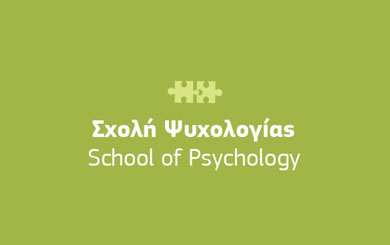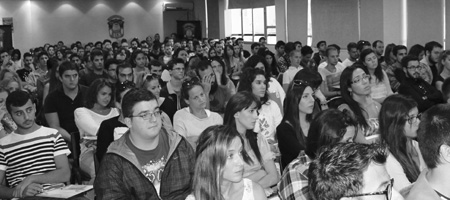

School of Psychology
- MSc Psychology of Addictions and Behavioural Change
- Professional Doctorate Counselling Psychology
- MSc Occupational Psychology
- MSc Forensic Psychology (with Psychotherapy)
- MSc Counselling and Psychology in Educational Settings
- MSc Applied Psychology: Health Psychology and Counselling
- MSc Applied Psychology: Clinical Psychology and Counselling
- MSc Integrative Counselling & Psychotherapy




MSc Forensic Psychology (with Psychotherapy)
-
The first private College to offer Psychology courses in Greece (1977).
-
Recognised degree by a TOP-30 UK University.
-
Combines Forensic Psychology with Integrative Psychotherapy.
-
Includes supervised, clinical placement.

Course Information
The School of Psychology at Mediterranean College has the longest experience in Greece in the provision of Psychology university courses. The MSc Forensic Psychology (with Psychotherapy) has been validated by the University of Derby (26th, Guardian University Guide 2020), to prepare students become competent forensic psychologists, who will work with offenders, victims and other professionals, having developed key theoretical and practical knowledge and skills in integrative psychotherapy.
Graduates may pursue careers in a wide range of settings, such as hospitals and clinics, offender management services, NGOs and forensic settings. They can also work as researchers and as private practitioners, working with risk populations, offenders & victims. Alternatively, they can continue their studies towards a PhD.
What you will learn
This course provides participants with the theoretical, practical and research knowledge, in order to apply this knowledge and skills to forensic settings and contexts. Students will enhance their psychotherapeutic skills, focusing on the integrative approach, which may be applied to offenders and victims. Finally, they become familiar with forensic assessments, rehabilitative interventions and with the principles of the psychology of criminal behaviour and victimology, so to be able to relate theory and research with these.
This MSc is rooted in the local framework, whilst acknowledging European and global frameworks and contexts. It is practical in nature, with the use of real-life examples, case studies and clinical placement, while at the same time includes personal development planning and cultivates the need for continuing professional development and lifelong learning. A minimum 100 hours clinical placement, with organised in-house supervision, is carried out in collaborating settings.
Why choose this course
We use multiple learning and teaching methods, including lectures, seminars, discussion sessions, case-based teaching, interactive workshops and lab sessions.
Throughout the programme, you will be expected to take an active role and will be encouraged to contribute to the investigation of concepts in written and oral format. This will enable you to further develop your critical and academic thinking, academic writing and argument building, personal development, reflection, communication and investigative skills.
In all modules, you will be directed to supplementary information sources, to complement the taught material and further encourage independent learning.
Courses
By the end of this module, students will gain the knowledge and skills to progress to working with a range of client groups including different types of offenders, patients and at-risk individuals; victims/ survivors; individuals across the lifespan (including children and young people in conflict with the law); males and females; professionals, groups and organisations. Via this module, students will learn about the application of psychological knowledge to the treatment of offender-patients, who commit violent acts against themselves or others. This form of treatment allows for a therapist to potentially understand the offender and their mental state, to examine further whether the offender’s criminal behavior was a conscious act or not, what exactly their association with violent behavior is, and what possible motives could have driven them. The main focus of forensic psychotherapy is to obtain a psychodynamic understanding of the offender, in order to attempt to provide them with an effective form of treatment. Via this module, students will be equipped with the knowledge and skills to progress to working within a range of settings and contexts relevant to forensic and criminal psychology, including prisons; secure units; hospitals; mental health; police; courts (including criminal, family and civil); community settings; charities and social enterprises. They should have an understanding of organisational culture and systems, and the ways in which these impact on the practice of forensic and criminal psychologists and other professionals. The second outcome of the module is that students should be able to demonstrate a critical understanding of different approaches to assessment and formulation in relation to individuals, groups and/or organisations. Also, demonstrate a familiarity with the processes and tools of assessment in line with the particular focus offered by the programme. At the end of this module, students should be able to demonstrate a critical understanding of the range of interventions available for offenders, patients and at-risk individuals, victims/survivors, professionals, groups and organisations. Students should understand different approaches and be able to identify the strengths and weaknesses of those approaches to inform the selection of appropriate interventions. Students should also be able to evaluate the effectiveness of these interventions. This module provides a comprehensive overview of the statistical methods, research designs and qualitative methods used in psychology. This module builds on students’ undergraduate knowledge and skills regarding psychological research, employing both quantitative and qualitative methodologies. The module will explore different quantitative and qualitative data collection and data analysis methods, along with their applications and their strengths and weaknesses. Students will also develop their practical and interview skills, by using SPSS for quantitative research for the former and by taking part in interview simulations for the latter, as well as appreciating ethical issues and dilemmas in research. The module will cover theories and skills in integrative psychotherapy, along with their application in forensic settings, considering potential ethical issues. Indicatively the module will examine topics around the role of psychotherapy in forensic settings and how these are applied, working with patients and other professionals and colleagues. The module will also cover issues around readiness and limits of competency with respect to patients. The dissertation is designed to enable students to apply their knowledge and skills to the development and implementation of a research project. The dissertation provides students with the opportunity to test their learning, display their subject knowledge and methodological skills, and explore in detail a topic that interests them. Once the initial proposal has been submitted, students are allocated to a supervisor with interests and knowledge appropriate to the chosen topic. The Psychology of the Offender and the Victim
Basic Principles and Skills of Forensic Psychotherapy
Forensic Risk Assessment and Case Formulation
Forensic Settings and Rehabilitative Interventions
Quantitative and Qualitative Research Methods
Integrative Psychotherapy in Action
Dissertation
Application & Enrolment
We use a rolling admissions policy, so we accept applications throughout the calendar year until all available places are filled. Since this is a course with a cap in student numbers, due to limitations in available placements, we urge you to submit your application in time.
We also offer multiple fee payment methods, individual payment plans and bursaries based on academic, athletic and socio-economic criteria.
Contact us today and find out more about this course and the available bursaries and funding opportunities. Our admissions advisors will provide you with all necessary information and will guide you through the application and enrolment process.
Admission Requirements
Our MSc Forensic Psychology (with Psychotherapy) is ideal for you, if you hold an undergraduate degree in Psychology or a Social Sciences degree, with a significant psychology content.
The minimum English language requirement is equivalent to IELTS 6.5 (C1). If you do not possess an official English language certificate, you can sit the College’s internal placement test.
Moreover, you’ll be asked to submit a resume, as well as a recommendation letter from employers and tutors, and you’ll be called for an academic interview with the programme leader.
Triantafyllia Illiopoulou holds a PhD in Criminology, an MSc in Criminology & Criminal Justice and a BSc in Social Work. She currently conducts a postdoctoral research on cybercrime in collaboration with the University of the Peloponnese. As a social worker she has worked in the Hellenic Police, Mental Health Centers, NGOs and at the Anticancer Society. Currently she is working at the School of Fine Arts providing psychosocial support to students while since 2018 she has been teaching at the University of West Attica. She has completed her training in Phenomenological & Existential Analysis & Psychotherapy, providing individual sessions. Penelope Louka holds a BSc (Hons) in Psychology and an MSc in Health Psychology from the University of Luton (Great Britain), and a Doctoral degree (PhD) in Social and Health Psychology from the University of Westminster (Great Britain). She has worked for several years as a lecturer at the University of Westminster at both Undergraduate and Postgraduate levels. Dr. Louka has published an array of articles in academic and scientific journals and international conferences. She is a Chartered Member (CPsychol) and an Associate Fellow (AFBPsS) of the British Psychological Society (BPS). Dr. Eleni Loupou Eleni Loupou obtained her PhD and MA at the University of Essex in the field of Psychoanalytic Studies and her BSc in Psychology. She has been trained in observing and recording the developmental stages that an infant goes through (mother-infant observation Tavistock Clinic) as well as observing and recording the dynamics that develop in the family setting, (University of Essex, Center for Psychoanalytic Studies). Throughout her career she has been employed by private settings, specialising in adult, child and adolescent therapeutic intervention. She was also employed by schools (Claydon Highschool) and a school-children’s home (The Ryes School). Olga Tzouramani is a Psychologist-Criminologist, holding an MSc in Integrative Counselling and Psychotherapy, an MSc in Criminology, and a PhD in Criminology from the University of Nicosia (Cyprus). She has teaching experience at the University of Nicosia, on the subject “Sexual and Violent Crimes” as part of the curriculum for the MSc in Criminology. She has also practical experience with substance abusing individuals at a rehabilitation center as well as with patients who have experienced different types of traumas, such as sexual abuse. Academic Team
 Dr. Triantafyllia Iliopoulou
Dr. Triantafyllia Iliopoulou
Social Worker – Criminologist – Researcher – Psychotherapist
 Dr. Penelope Louka
Dr. Penelope Louka
Health Psychologist, Head of the School of Psychology at Mediterranean College

Child Psychologist - Psychotherapist, Programme Leader of the Counselling & Psychotherapy programmes
 Dr. Olga Tzouramani
Dr. Olga Tzouramani
Psychologist-Criminologist
Testimonials
At Mediterranean College I studied the BSc (Hons) Applied Psychology course, which offered me the necessary skills to be accepted for postgraduate studies in London (MSc Clinical Applications of Psychology – Kingston University London) and become a member of the British Psychological Society – MBPsS). Starting from scratch, the College and its outstanding academic tutors provided me the theoretical and practical background to be employed and continue to work until...
Spyros Vlaseros, BSc (Hons) Applied Psychology
I started my studies at Mediterranean College in 2008 when I followed the BSc in Psychology and Counselling course through the University of Teesside. Mediterranean College provided me with the foundation upon which I based my career. After completing the BSc, I moved to England, obtained two Master’s degrees and started working as a research assistant at the University of Teesside. I am completing now my final PhD year with...
Theodora Machaira, BSc (Hons) Psychological Sciences & Counselling
Completing the academic programme BSc in Counselling & Psychology at the Mediterranean College, I managed to register with the British Psychological Society as a Graduate Member, I have been working as an independent mental health professional with my private practice until today, Ι linked with other professionals in the Psychology and Mental Health field, I wrote two psychology books which have been officially published, and also, having an accredited (by...
Evangelos Kousiadis, BSc (Hons) Psychological Sciences & Counselling




